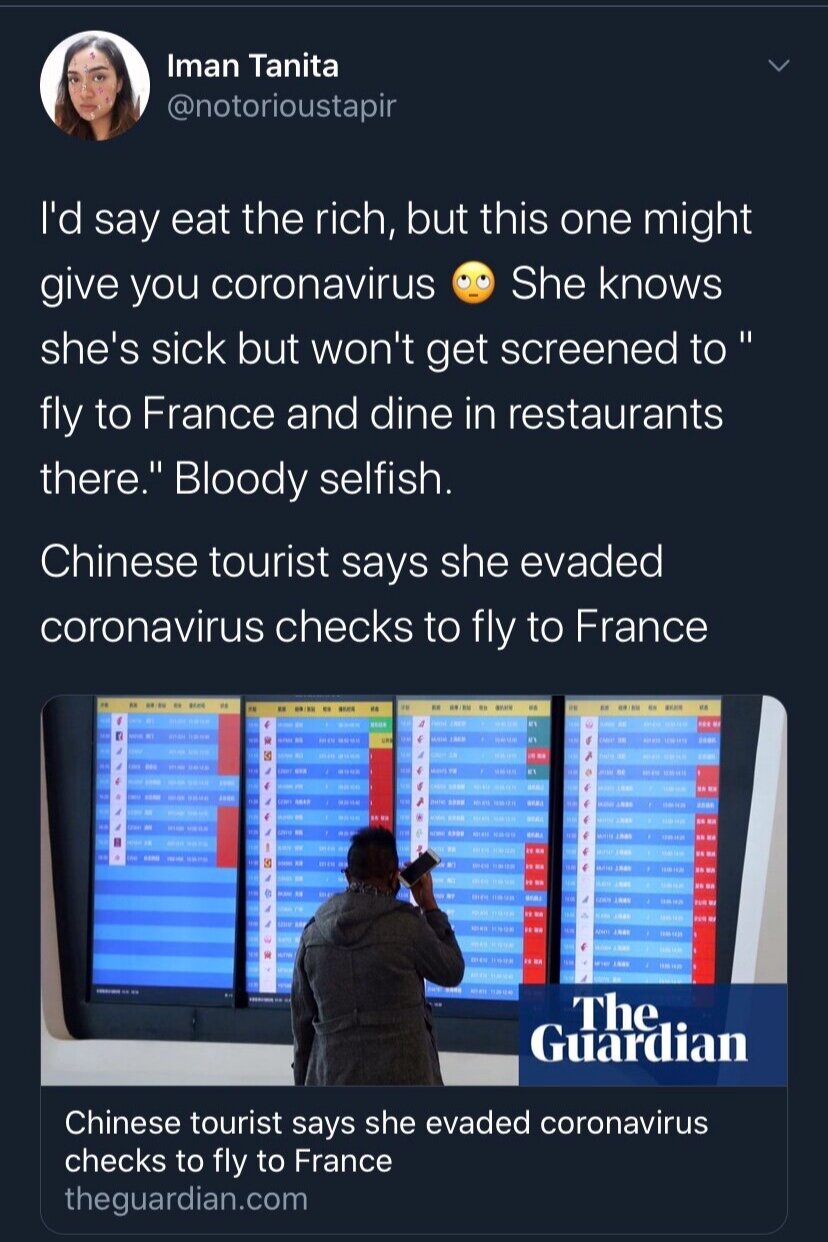Twitter’s Ablaze With “Eat The Rich”
Twitter. The tantalizing, potentially-malicious-yet-somehow-informative blue bird app that many users worldwide are addicted to. You know the one, right? The app that gives all of us the most direct access to the celeb-verse? Twitter is most popular for its hilarious critiques of our favorite (and least favorite) celebrities. The phrases and mentalities coined and created by Twitter users tend to take over the masses in a subtle infiltration. It’s newest phrase? “Eat the Rich.” In today’s digital world, the saying is used to exclaim outrage or disbelief when the 1% exhibits behavior that is hypocritical, absurd, or just over-the-top. In Paris of 1793, where the phrase originated, it was used quite literally in the sense that the poor were fatally starving. Needless to say, you’d be surprised by how deep the sociopolitical roots of this one can go.
Kaylen Ward via 10Daily
The 2020 iteration of “Eat the Rich” came to its strongest peak in the height of the Australian wildfires. Random, you’d think, considering that catastrophic natural disasters have been wreaking havoc across the world for, at the very least, the last year. However, the Australian wildfires had an unanticipated hero: Kaylen Ward, self-dubbed and commonly referred to as “The Naked Philanthropist.” Ward, a 20-year-old model, pledged on Twitter that she would send one nude photo of herself with proof that that person donated at least $10 to an approved foundation helping with the Australian wildfires. She also donated $1,000 of her own money.
Ward raised half a million dollars in two days. By the end of her cyber-campaign, she estimated that everyone who helped participate raised about $1,000,000 for the wildfires.
This act of heroism, if you will, inadvertently redirected attention back to celebrities, our very own rich and famous. Jeff Bezos, the richest man in the world (even after a divorce that stripped him of half of his fortune), donated less than The Naked Philanthropist raised through selling naked photos. The cyberverse that many of us inhabit was outraged. How could the richest man in the world donate less than a random young woman could raise when part of our world is burning?
This isn’t the first time Twitter has called out the rich for not donating, or at least advocating for, natural disasters or devastating happenstances. When the Notre-Dame building was burning for one day, while the Amazon Rainforest had already been ablaze for at least a week, the wealthy rushed to assistance like our world had never really seen before. Twitter, and the media, criticized those who donated so much so quickly to a building for not giving the same attention to a critical part of our entire planet’s ecosystem that provides 20% of Earth’s oxygen emissions. Hence the fruition of the infamous “Eat The Rich.”
This all may seem random, or like a display of overwrought rage from civilians. However, in the height of this year’s election season, the Democratic candidates and their ideologies have drawn further attention to the increasingly clear wealth class disparity between the rich and everyone else. This disparity is calling for more transparency, more honesty, and more demands. Mo’ money, mo’ problems. Heard of it?
As much as it would be nice to know where the 1% are donating their money, it also comes down to a matter of privacy, and even humility. Kim Kardashian actually called this out when being accused of not donating to the Australian wildfires when she replied with, “Nothing gets me more heated than to see people think they know what we donated to and to think we have to publicize everything.”
Source: Twitter
It’s a question of morality and privacy. As much as we hold the wealthy to a certain philanthropic standard, as they jet around and own boatloads of high-end cars that guzzle premium gas while we all have to use soggy paper straws, is it our job to hold them accountable? Or is it more our job to criticize the hypocrisy we witness from them on a daily basis?








